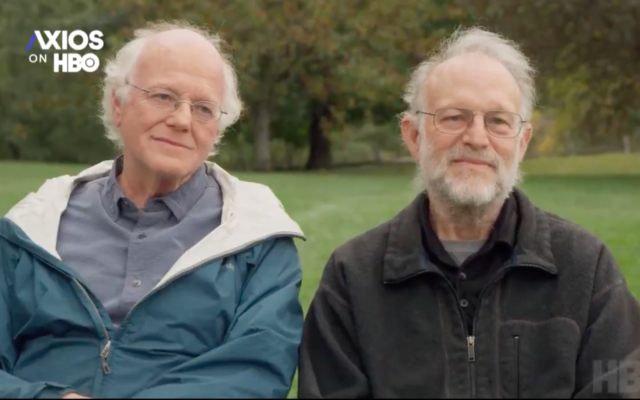Ben & Jerry’s founder asked: Why only boycott West Bank? His reply: I don’t know
Ice cream makers Ben Cohen and Jerry Greenfield stand by controversial decision but cannot explain why they still sell in US states that passed controversial abortion laws.

In an interview that aired on HBO, both of the founders of the Ben & Jerry’s ice cream brand reiterated that they stand behind the company’s decision to stop selling their products in the West Bank.
But for Jerry Greenfield, being accused of antisemitism is “painful.” For Ben Cohen, it’s “absurd.”
“I think Ben & Jerry’s and Unilever are being characterised as boycotting Israel, which is not the case at all. It’s not boycotting Israel in any way,” Greenfield said in an interview with Axios that aired on its HBO show Sunday night.
The Jewish duo, who founded the company in 1978, are no longer its owners, but they remain the most recognisable public faces of the company. They had previously defended the West Bank decision in a New York Times op-ed shortly after the move took place in July, but the Axios interview gave them a chance to expound on the human side of the aftermath.
“I understand people being upset, it’s a very emotional issue for a lot of people and I totally understand it and it’s a very painful issue for a lot of people,” Greenfield said.
They were also asked how it felt to be “wrapped up in accusations of antisemitism.”
“Totally fine,” Cohen said, laughing. “It’s absurd. What, I’m anti-Jewish? I’m a Jew! All my family is Jewish, my friends are Jewish.”
Ben & Jerry's co-founder Jerry Greenfield tells @alexi that "misinformation" is causing states to divest from its parent company Unilever:
"Ben & Jerry's and Unilever are being characterized as boycotting Israel, which is not the case at all." #AxiosOnHBO pic.twitter.com/AUkQ0L5qNp
— Axios (@axios) October 11, 2021
Ben & Jerry’s had long been engaged in social issues when it decided to pull its product from the West Bank, after months of pressure from pro-Palestinian activists in the wake of Israel’s latest armed conflict with Gaza. The decision prompted calls to boycott Ben & Jerry’s and its parent company Unilever, along with accusations of antisemitism from some pro-Israel activists. The state of Arizona divested nearly $200 million from Unilever in September, and several other states have since reviewed their investments in the conglomerate.
Unilever has also said in public statements that it does not believe Ben & Jerry’s is boycotting the state of Israel, and that it plans to keep selling within the borders Israel established after the Six-Day War in 1967. However, Israeli law outlaws business that boycotts the West Bank, so it remains to be seen whether the company will be allowed to follow through with its plan.
When asked why Ben & Jerry’s continues to sell its ice cream in states with policies that are not in line with Cohen and Greenfield’s values — such as Texas, where access to abortion is now limited, and Georgia, where voting rights have been curtailed — Cohen did not have an answer.
“I don’t know. I mean it’s an interesting question, I don’t know what that would accomplish, we’re working on those issues of voting rights and…I don’t know. I think you ask a really good question, and I think I’d have to sit down and think about it for a bit,” Cohen said.
Greenfield suggested that the answer had to do with international law.
“One thing that’s different is that what Israel is doing is considered illegal by international law, so I think that’s a consideration,” Greenfield said.

Thank you for helping to make Jewish News the leading source of news and opinion for the UK Jewish community. Today we're asking for your invaluable help to continue putting our community first in everything we do.
For as little as £5 a month you can help sustain the vital work we do in celebrating and standing up for Jewish life in Britain.
Jewish News holds our community together and keeps us connected. Like a synagogue, it’s where people turn to feel part of something bigger. It also proudly shows the rest of Britain the vibrancy and rich culture of modern Jewish life.
You can make a quick and easy one-off or monthly contribution of £5, £10, £20 or any other sum you’re comfortable with.
100% of your donation will help us continue celebrating our community, in all its dynamic diversity...
Engaging
Being a community platform means so much more than producing a newspaper and website. One of our proudest roles is media partnering with our invaluable charities to amplify the outstanding work they do to help us all.
Celebrating
There’s no shortage of oys in the world but Jewish News takes every opportunity to celebrate the joys too, through projects like Night of Heroes, 40 Under 40 and other compelling countdowns that make the community kvell with pride.
Pioneering
In the first collaboration between media outlets from different faiths, Jewish News worked with British Muslim TV and Church Times to produce a list of young activists leading the way on interfaith understanding.
Campaigning
Royal Mail issued a stamp honouring Holocaust hero Sir Nicholas Winton after a Jewish News campaign attracted more than 100,000 backers. Jewish Newsalso produces special editions of the paper highlighting pressing issues including mental health and Holocaust remembrance.
Easy access
In an age when news is readily accessible, Jewish News provides high-quality content free online and offline, removing any financial barriers to connecting people.
Voice of our community to wider society
The Jewish News team regularly appears on TV, radio and on the pages of the national press to comment on stories about the Jewish community. Easy access to the paper on the streets of London also means Jewish News provides an invaluable window into the community for the country at large.
We hope you agree all this is worth preserving.





















